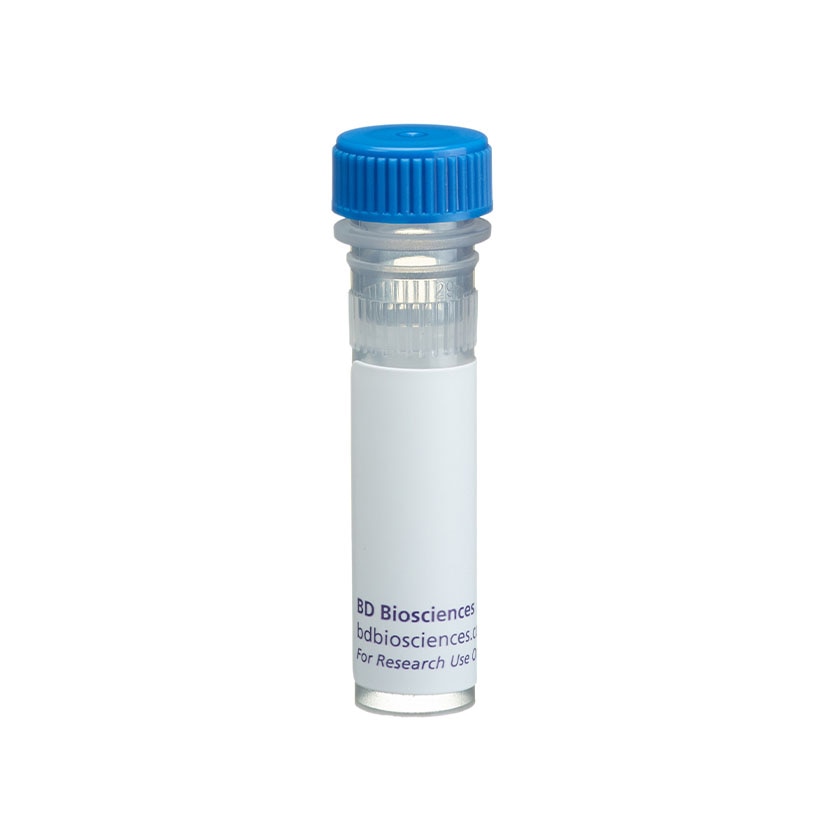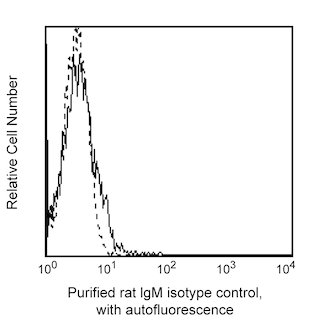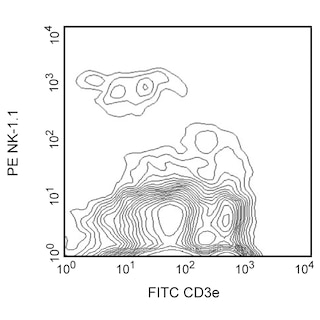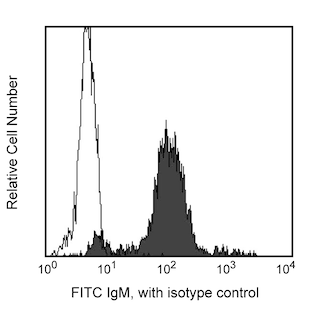Old Browser
This page has been recently translated and is available in French now.
Looks like you're visiting us from {countryName}.
Would you like to stay on the current country site or be switched to your country?




Detection of NK cells with monoclonal antibodies. Freshly isolated splenocytes from a C57BL/6 mouse were simultaneously incubated with PE mouse anti-mouse NK-1.1 antibody (NKR-P1B and NKR-P1C) (clone PK136) (MN 557391, both panels), and purified rat anti-mouse CD49b antibody (clone DX5) (right panel), followed by a FITC mouse anti-rat IgM antibody (clone G53-238) (Cat. No. 553887, both panels). Flow cytometry was performed on a BD FACScan™ instrument (BD Biosciences, San Jose, CA).


BD Pharmingen™ Purified Rat Anti-Mouse CD49b

Regulatory Status Legend
Any use of products other than the permitted use without the express written authorization of Becton, Dickinson and Company is strictly prohibited.
Preparation And Storage
Product Notices
- Since applications vary, each investigator should titrate the reagent to obtain optimal results.
- Please refer to www.bdbiosciences.com/us/s/resources for technical protocols.
- Caution: Sodium azide yields highly toxic hydrazoic acid under acidic conditions. Dilute azide compounds in running water before discarding to avoid accumulation of potentially explosive deposits in plumbing.
- Sodium azide is a reversible inhibitor of oxidative metabolism; therefore, antibody preparations containing this preservative agent must not be used in cell cultures nor injected into animals. Sodium azide may be removed by washing stained cells or plate-bound antibody or dialyzing soluble antibody in sodium azide-free buffer. Since endotoxin may also affect the results of functional studies, we recommend the NA/LE (No Azide/Low Endotoxin) antibody format, if available, for in vitro and in vivo use.
Companion Products



The rat anti-mouse CD49b monoclonal antibody (clone DX5) specifically binds to the integrin α2 chain (CD49b). CD49b is a 150 kDa transmembrane glycoprotein that non-covalently associates with CD29 (integrin β1) to form the integrin α2β1 complex known as VLA-2. The rat anti-mouse CD49b antibody (clone DX5) has been reported to identify the majority of NK cells and a small T-cell subpopulation in most mouse strains (e.g., A/J, AKR, BALB/c, C3H/HeJ, C57BL/6, C57BL/10, C57BR, C58, CBA/Ca, DBA/1, DBA/2, SJL, SWR, 129/J, but not NOD). The DX5 antibody also recognizes platelets that express high levels of CD49b. Multiparameter flow cytometric analysis has demonstrated that most lymphocytes which express NK-1.1 (NKR-P1B and NKR-P1C), as detectable by mouse anti-mouse NK-1.1 antibody (clone PK136), also express the DX5 antigen. Small DX5+ NK-1.1- and DX5- NK-1.1+ cell subsets are found, especially among the CD3-positive cell population. Some CD49b+ NK cells have been reported to gradually lose reactivity with the rat anti-mouse CD49b antibody (clone DX5) when cultured in the presence of recombinant human IL-2. The resulting DX5-negative cells have weakened cytotoxic activity when compared to the remaining DX5+ cells. This indicates that the DX5 antibody distinguishes functional subsets of NK cells. No activation or blocking activity of the rat anti-mouse antibody (clone DX5) has been observed. Staining of splenic NK cells with this antibody reportedly can be blocked by hamster anti-mouse CD49b antibody (clone HMα2).
This antibody is routinely tested by flow cytometric analysis. Other applications were tested at BD Biosciences Pharmingen during antibody development only or reported in the literature.
Development References (5)
-
Abrams J. Personal Communication. .
-
Arase H, Saito T, Phillips JH, Lanier LL. Cutting edge: the mouse NK cell-associated antigen recognized by DX5 monoclonal antibody is CD49b (alpha 2 integrin, very late antigen-2). J Immunol. 2001; 167(3):1141-1144. (Clone-specific: Blocking, Cytotoxicity, Flow cytometry). View Reference
-
Moore TA, von Freeden-Jeffry U, Murray R, Zlotnik A. Inhibition of gamma delta T cell development and early thymocyte maturation in IL-7 -/- mice. J Immunol. 1996; 157(6):2366-2373. (Biology). View Reference
-
Ortaldo JR, Winkler-Pickett R, Mason AT, Mason LH. The Ly-49 family: regulation of cytotoxicity and cytokine production in murine CD3+ cells. J Immunol. 1998; 160(1):1158-1165. (Biology). View Reference
-
Sepulveda H, Cerwenka A, Morgan T, Dutton RW. CD28, IL-2-independent costimulatory pathways for CD8 T lymphocyte activation. J Immunol. 1999; 163(3):1133-1142. (Biology: Cytotoxicity, Immunohistochemistry). View Reference
Please refer to Support Documents for Quality Certificates
Global - Refer to manufacturer's instructions for use and related User Manuals and Technical data sheets before using this products as described
Comparisons, where applicable, are made against older BD Technology, manual methods or are general performance claims. Comparisons are not made against non-BD technologies, unless otherwise noted.
For Research Use Only. Not for use in diagnostic or therapeutic procedures.
Report a Site Issue
This form is intended to help us improve our website experience. For other support, please visit our Contact Us page.